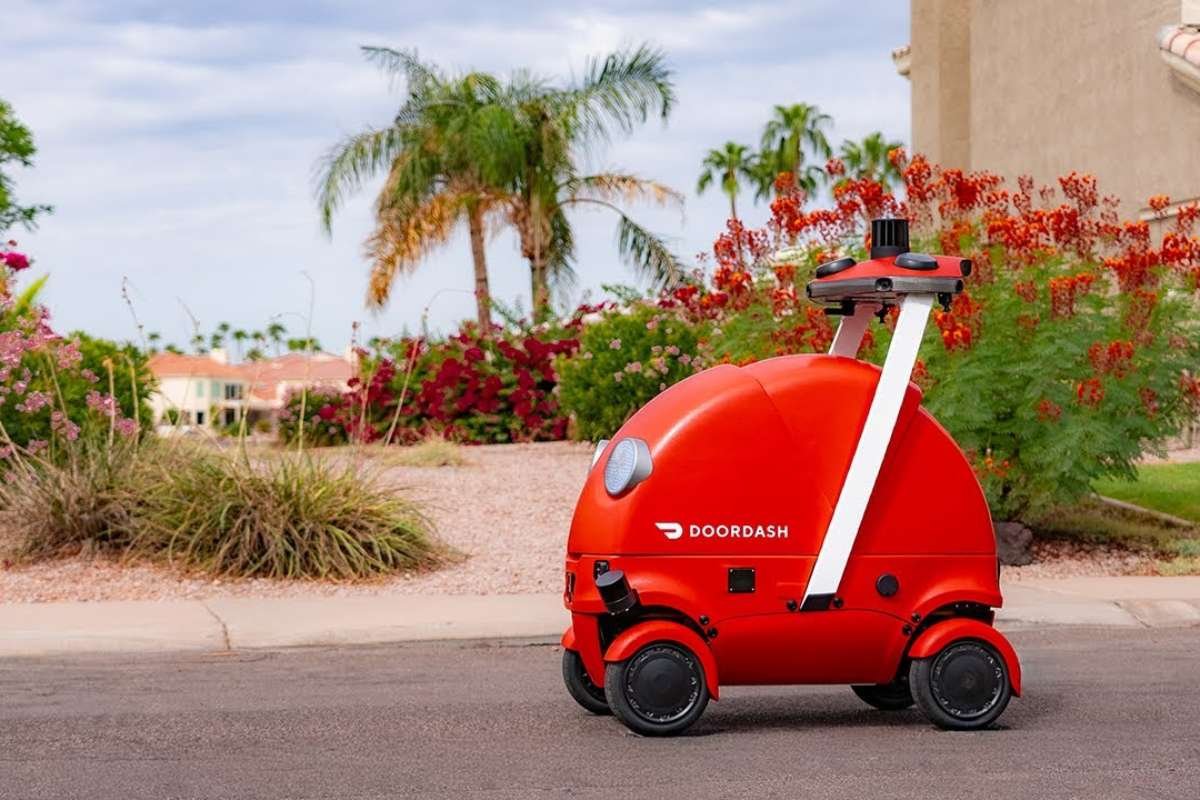Key Points:
- Dot Debuts: DoorDash introduces Dot, its first in-house autonomous delivery robot, designed for fast, local deliveries on sidewalks, roads, and bike lanes.
- Efficiency Boost: Dot integrates with DoorDash’s Autonomous Delivery Platform to optimize routes, reduce emissions, and improve delivery speed and reliability2.
- Pilot Launch: The robot begins commercial rollout in Tempe and Mesa, Arizona, with plans to expand across more markets
DoorDash autonomous delivery takes a leap forward with Tuesday’s launch of its new robot, Dot, marking the company’s latest move into automation. Capable of reaching speeds of up to 20 miles per hour and carrying loads of up to 30 pounds, Dot is designed to navigate busy streets, sidewalks, and parking lots to deliver food orders more efficiently.
Expanding Into Autonomous Delivery
Dot is DoorDash’s first standalone investment in autonomous vehicle technology, reinforcing the DoorDash autonomous delivery strategy. It complements the company’s earlier tests with drones and its sidewalk delivery partnership with Coco Robotics. According to DoorDash co-founder and DoorDash Labs lead Stanley Tang, the decision to build an in-house robot stems from the company’s unique delivery demands.
“The scale and complexity of the business demands something like autonomy, and there isn’t anything out there that fits our use case,” Tang said. He emphasized that Dot is intended not just to support DoorDash’s delivery ecosystem, but also to help local merchants streamline operations as order volumes and delivery complexities rise.
DoorDash autonomous delivery is being piloted in Phoenix, where it is available to merchants through the company’s new autonomous delivery platform. This platform also incorporates drone delivery in areas where airspace regulations allow. Pending successful results, the company plans to expand Dot into additional metropolitan markets.
The robot is built with eight cameras and three lidar sensors, giving it the ability to maneuver through common urban delivery challenges such as crowded parking lots, blocked bike lanes, and congested city streets. It also includes an internal camera to maintain food quality during transport.
Business Impact and Market Position
DoorDash autonomous delivery is entering an increasingly competitive space, as companies like Uber pursue robotics and drone solutions. Earlier this month, Uber announced a food delivery collaboration with Flytrex, an Israeli drone startup, and has previously trialed deliveries with self-driving Waymo cars. DoorDash’s launch of Dot signals that the company is determined to strengthen its position in this growing market.
In addition to the robot, DoorDash introduced SmartScale, a feature that automatically weighs orders to detect missing items before delivery. Early testing indicates the system has cut missing item complaints by as much as 30%, addressing one of the most common sources of customer dissatisfaction. For merchants, this enhancement can help reduce refund costs and improve customer trust, while for DoorDash, it streamlines operations and protects brand reputation.
The potential business benefits of DoorDash autonomous delivery are significant. For restaurants and retailers, the robot could help reduce delivery delays, lower labor-related expenses, and increase overall reliability. For DoorDash, automation supports scalability as the company continues to expand its reach in an industry where demand for on-demand delivery remains strong.
By integrating both robotics and AI-powered features into its logistics network, DoorDash is positioning itself as a technology-driven delivery platform rather than just a marketplace. The company’s investment in autonomy is a step toward reducing dependency on traditional delivery models and improving margins in a sector known for tight unit economics.
Looking Ahead
While DoorDash has not yet announced a full rollout schedule, the Phoenix pilot will provide critical data on Dot’s performance in real-world conditions. If successful, wider adoption could follow, making Dot an increasingly familiar sight in cities across the United States.
For entrepreneurs and business owners, particularly those in food service and retail, the launch underscores a broader trend: automation is rapidly reshaping last-mile logistics. DoorDash’s investment signals confidence that robots and drones will become integral to the future of delivery.
As companies across the industry test new solutions to meet rising consumer expectations, DoorDash autonomous delivery may prove to be a decisive factor in shaping competitiveness and operational efficiency. DoorDash’s Dot represents both a milestone for the company and a sign of where the broader delivery market is heading.
Visit Enterprise Wired for the most recent information.










